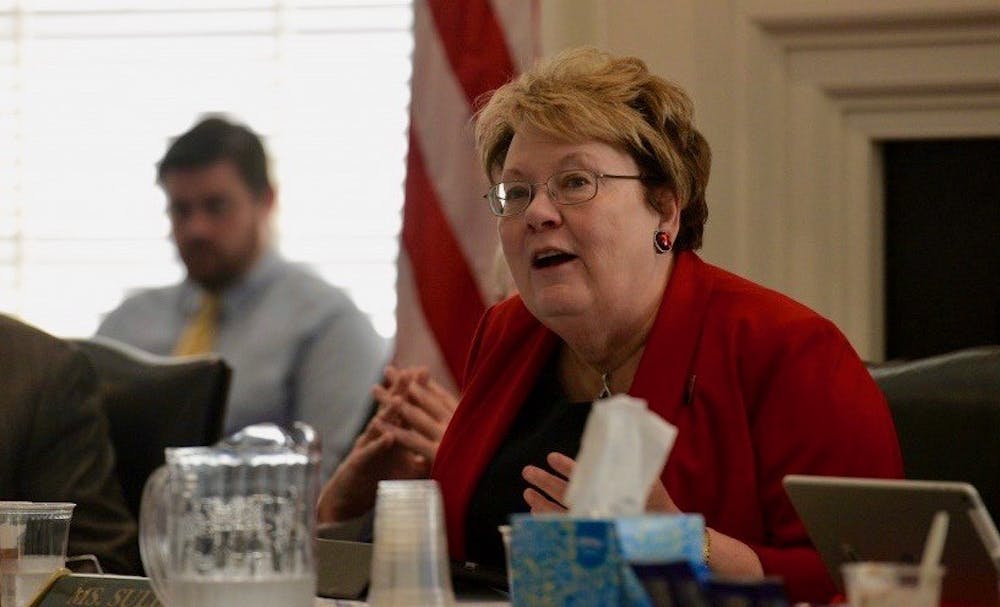In May 2018, former President Teresa Sullivan announced an amendment to the University’s standing policy on speech on Grounds. The new policy includes a provision regarding the use of the University’s facilities as a platform for expressive thought, ultimately requiring people unaffiliated with the University to “make reservations to engage in expressive activity in certain designated locations, on certain days and during certain hours.” The strengthening of this policy was largely in direct response to the events of white supremacy in August 2017, serving the purpose of protecting the students, faculty and staff who walk the Grounds — however, the revision is unnecessarily restrictive and violates our constitutional freedoms.
The Bill of Rights was designed to secure the promises of the Constitution, supporting people’s individual rights and freedoms above and beyond the scope of government’s powers. Formalizing the protections of specific “freedoms of the mind, will and heart,” the First Amendment safeguards the free exercise of religion and speech. Thomas Jefferson, an early supporter of the Bill of Rights and contributor to the First Amendment, established the University on these fundamental tenets — not only did Jefferson defend the freedom of conscience, but he believed it to be a natural right of mankind, innate to our mere existence.
The commitment to free speech nationwide, predicated upon the intentions of our founders, was tried when a group of white supremacists marched on Grounds, spewing hate speech and inciting violence. Struggling to find an optimal balance between free speech and campus safety, President Sullivan favored the scales of safety. Laura Beltz, program officer for policy reform at the Foundation for Individual Rights in Education, expressed that this policy decision is indeed within the University’s rights “to put limits on speakers who aren’t affiliated with the university.” However, attaching a requirement to reserve space seven days in advance to the intended speaking date and limiting the spaces available to deliver such speech, breach a fundamental principle of our guiding documents.
Soon after the University’s policy implementation, alumnus Bruce Kothmann preached from his Bible on the Rotunda in an attempt to challenge the policy designed to limit speech on Grounds. As he spoke, an officer approached him and told him of his transgressions in accordance to the rules, ordering him to stop or submit to arrest. This incident begs us to ask, what exactly is at stake here? What does this mean for public universities on a broader scale? Kothmann explains that these constraints on freedom of speech ultimately compete with the words of our founders, “The Jeffersonian tradition is to allow people to express even unwelcome ideas … You answer speech with speech … That’s the antidote to damaging speech.”
While the University provides a sound argument grounded in the fact that it has an obligation to protect its students from harmful speech, it sets a dangerous precedent for college campuses nationwide. The American Civil Liberties Union reasons that “such restrictions deprive students of their right to invite speech they wish to hear, debate speech with which they disagree, and protest speech they find bigoted or offensive. An open society depends on liberal education, and the whole enterprise of liberal education is founded on the principle of free speech.” The right to speak freely, whether it be speech from affiliated or unaffiliated persons, is not only law, but it is an essential part of our civic education. I am sensitive to the fact that the University’s new speech policy was crafted largely in response to targeted violence that left students vulnerable to hostile behavior — however, barring unaffiliated persons, including alumni, from standing on the steps of the Rotunda and speaking freely is a form of censorship and only falsely purifies our discourse.
When we begin to tighten the reins on disagreeable speech and develop an intolerance of the protected right of free expression, we begin to institutionalize a coddling of the American mind. If the intention of free speech policy is to ensure the utmost “safety and security of every member of this community,” as former President Sullivan emphasized, the University’s revised plan does not fulfill this promise as it stands — affiliated persons can still deliver hate speech without repercussion. Instead, the policy breaches liberty of thought and discussion, ethically compromising the role a public organization can play by infringing on individual, inalienable freedoms.
Lucy Siegel is an Opinion Columnist and was an Opinion Editor for the 128th term of The Cavalier Daily. She can be reached at l.siegel@cavalierdaily.com.







